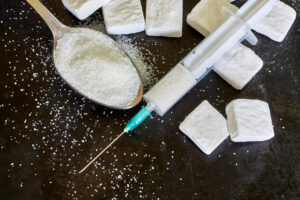In 2020 I invited a group of 41 international dental hygienist and dental therapist colleagues to join me in a research project that I was keen to undertake. The subject of our curiosity was added-sugar and behaviour change. My research is ongoing, and you can read about it in the Annual Clinical Journal of Dental Health.1,2
One of my initial discoveries was that, for a variety of reasons, these dental hygienists and dental therapists struggled to stop eating sugar. The biggest surprise for many was to realise that they were, in fact, addicted to sugar and therefore unable to kick the habit without help and support.

In my second study, one of the participants set up a support group on Facebook. Fifteen members joined and participated. It was subsequently found that those dental hygienists and therapists who joined the support group were more likely to be successful in quitting sugar.
Following on from this, in 2021 I created a ‘no-added-sugar- tribe’ involving sixteen of the 41 original participants. For three months, the group was asked to join weekly online video meetings to provide emotional and mental support for one another and avoid added-sugar in their diets. The results were amazing!

Most participants lost weight, were more happy and far healthier both mentally and physically, so much so, they did not want the study to end. In February 2023, just over a year since they left the ‘tribe’, I sent the participants an online questionnaire to discover how they were currently managing their relationship with sugar. This follow-up provides a general summary of their responses and discusses the implications for successful behaviour change amongst dental teams and our patients.
Looking back, what were your general thoughts on being a member of the no-added-sugar tribe for three months?
For all participants, it had been a positive experience. All had benefited from hearing and sharing one another’s experiences and struggles.
“I worried it might be a bit cult-y and Slimming World-esque initially, but we were all so supportive of each other and I really enjoyed the meetings.”P1b
“It was a very positive experience. I gained knowledge on all things to do with sugar and sweeteners and became much more aware of my consumption. It also gave a great sense of community and accountability.” P1a
How did your mental and physical health change during the three months when you were a member of the tribe?
There was confirmation of the improvements in their mental and physical health, including weight loss.

“My mental and physical health changed beyond recognition during the research. How much of that was down to the absence of sugar and how much was the support that the tribe brought, is hard to define. It was such a profound change for me that the lines are a little blurred….” P1d
Has your added-sugar consumption changed since you stopped participating in the online meetings?
There was approximately a 50:50 split in participants who have remained added-sugar free for the last year and those who had let sugar creep back into their diet. Many of those who had abstained, had noticed a change in taste sensation, so much so that they now disliked the taste of sweetened foods and drinks. Of those who were still consuming added-sugar, some were at much lower levels than previously. However, others had allowed added-sugar back into their lives completely, despite having been previously convinced this would not happen!
“It took a while as the health benefits were so profound for me and I couldn’t ever imagine going back but as I relaxed around it and allowed gaps to appear in my rigid no-sugar diet it soon became less of a gap and more of an open flood gate!” P1d
Has your mental and physical health changed since you stopped participating in the online meetings?
Those whose diets had remained free of added-sugar noticed very little change in their mental and physical health while most of those who were now once again consuming sugar, noticed a deterioration.
“I let sugar gradually creep back into my diet so that’s been a big change. Physically I gained weight and stopped exercising as much as my energy levels dropped. Mentally that has an impact. The thought of eliminating sugar again feels daunting without being part of the research group and having the momentum of a tribe all pushing forwards together.” P3a
Two participants have recently had babies. Both have been consuming sugar and noticed a deterioration in their physical and mental health. This was attributed to a combination of morning sickness, feeling tired and an increase in sugar consumption.
Please describe what you have learnt about your relationship with sugar.
“It's everywhere. It's addictive. It's unhealthy. it's so good. It makes me happy, but only for a while.” P3b
All the dental professionals discussed the addictiveness of sugar and how quickly their consumption increased unless they were extremely vigilant. Most are convinced they are addicted to sugar.

“Quite simply I am a sugar addict. I cannot have it without craving more and more. It is my version of heroine. My version of nicotine. My version of alcohol. There’s very little space between abstinence and binge.” P1d
Has anything changed regarding your relationship with colleagues and patients on the topic of sugar since the study ended?
Most participants had changed the way that they communicate advice regarding sugar reduction or cessation with their patients.
“I now approach these conversations entirely differently and am better placed to support them. I have independently sourced details of other healthcare professionals in the area around where I work so I start conversations now knowing I have the resources to refer on.” P1d
Some of the participants were already making sugar cessation discussions a priority prior to taking part in the study. A few, for various reasons, have been reluctant to discuss sugar addiction and cessation.
“Since I have been eating sugar again, it has felt a little hypocritical to bring up the subject when I know it’s not something I’m currently following.” P1b
Do you have any other comments?
“I am staggered by others resistance to give up sugar.” P2b
“It is criminal that more weight is not put on it as a serious dental and health issue, but I’m not surprised.” P3a
Discussion
I have previously documented the alarming statistics regarding sugar and our nation’s oral and systemic health.1,2
We are the ‘frog that is being boiled alive’ and the temperature is now getting very warm.3
The UK National Health Service (NHS) provides help and information on its website and lists the most common addictions as: gambling; drugs; alcohol; and smoking. There is also mention of: work; internet; solvent; and shopping addictions. There is no mention of sugar or processed foods!4 Most sugar is bound up in processed foods.5
A systematic review on food addiction concluded: “Overall, findings support food addiction as a unique construct consistent with criteria for other substance use disorder diagnoses. The evidence further suggests that certain foods, particularly processed foods with added sweeteners, demonstrate the greatest addictive potential”6. It is essential that the NHS aligns its advice and guidance with the current evidence base!
The participants in this study have clearly demonstrated that reducing and/or quitting added sugar is far from straightforward and simply educating and/or advising patients on this topic will not end in success for all. At the same time, sugar cessation is almost certainly within our remit, and if successful, may have the biggest impact on a patient’s and clinician’s oral and systemic health.
In this study it has been demonstrated that to reduce and/or quit sugar successfully, some people need constant support. In the long-term we should investigate the possibility of creating and developing practice supported groups for patients and staff needing guidance regarding sugar addiction and cessation.
![]()
Thank you to all the participants who gave up their time to increase our knowledge, reduce disease and help our patients become healthier. If you feel you need more help and guidance with any of the above, please get in-touch.
References
1. Ives T. An investigation into what dental hygienists and dental therapists would discover if they attempted to stop consuming added-sugar for 28 days. Ann Clin J Dent Health. 2021;10:11-15.
2. Ives T. An investigation into knowledge gained by a group of dental hygienists and dental therapists invited to join a ‘no-added-sugar tribe’. Ann clin J Dent Health. 2022;11:50-55.
3. Canadian Medical Association Journal. The tale of the boiling frog. CMAJ. 2004;171(12):1425. doi: 10.1503/cmaj.1041718 Available from: https://www.ncbi.nlm.nih.gov/pmc/articles/PMC534568/ (Accessed March 2023).
4. NHS. Addiction: what is it? Available from: https://www.nhs.uk/live-well/addiction-support/addiction-what-is-it/ (Accessed March 2023).
5. Ifland J. Processed Food Addiction: Foundations, Assessment and Recovery. New York: CRC Press, 2020.
6. Gordon EL, Ariel-Donges AH, Bauman V, Merlo LJ. What is the evidence for ‘food addiction?’ A systematic review. Nutrients: 2018;10(4): 477. https://doi.org/10.3390/nu10040477
Top Tips
In the short-term, to be more successful and start to reduce the strain on our dental services there are
many small steps we could take within our dental practices.
1. Attempt the 28 day no-added-sugar challenge – see how far you can go and what you learn from the experience.
2. Become the sugar expert in your practice.
3. Discuss with your dental teams the importance of this topic. Ensure all staff are ‘singing from the same hymn sheet.’
4. Consider opening a dialogue about sugar addiction with your patients and start to identify the ones who would benefit from more support.
5. Start to measure your success rate and reflect on what works and why.
6. As a team, develop a plan as to how you can be more successful and set goals. Give updates at team meetings and ensure it stays on the agenda. Be creative!
ORIGINALLY PUBLISHED IN THE JOURNAL OF DENTAL HEALTH | VOLUME 62 NO 3 OF 6 MAY 2023